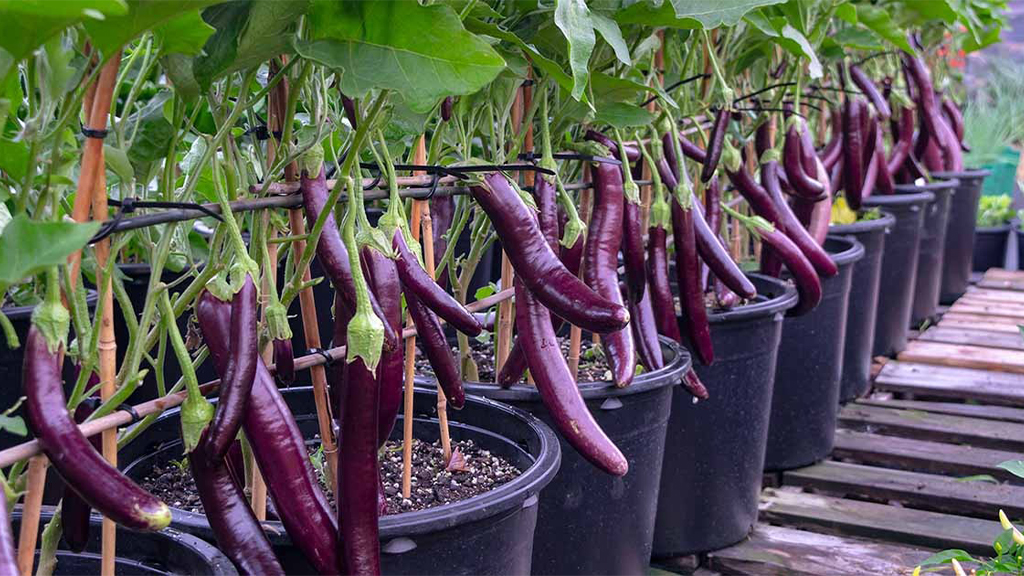Eggplants are a delicious and versatile vegetable that can be used in a variety of dishes. Growing eggplants indoors is a great way to enjoy fresh produce year-round, regardless of the weather outside. You can successfully grow eggplants in your home with these five tips.
Choose the right container and soil
Eggplants need a deep container that can hold at least five gallons of soil. The container should also have drainage holes to prevent water from pooling at the bottom. The soil should be well drained and nutritious with a pH between 5.5 and 6.5. You can use a commercial potting mix and add some compost or fertilizer to improve the soil quality.

Make sure you have enough light
Eggplants need a lot of light to grow. Be sure to place them in a sunny spot or under grow lights. They need at least six hours of direct sunlight every day. If you don’t have enough natural light, you can use artificial grow lights that mimic sunlight. Leave the lights on 12 to 14 hours a day.
Water and fertilize regularly
Eggplants need consistent moisture to grow well. Water them when the top inch of soil feels dry. Be careful not to water too much as this can cause root rot. You can also fertilize the plants every two to four weeks with a balanced fertilizer. Follow the directions on the pack for application amounts.
Control pests and diseases
Eggplants are susceptible to pests such as aphids, spider mites and whiteflies. You can prevent an infestation by keeping the plants clean and free of debris. If you notice any pests, you can control them with insecticidal soap or neem oil. Eggplants are also susceptible to fungal diseases such as powdery mildew and Verticillium wilt. To prevent these diseases, ensure good air circulation and avoid overcrowding the plants.
Prune and support the plants
Eggplants can become top-heavy as they grow, so it’s important to support them with stakes or a trellis. You can also prune the plants to encourage bushier growth and increase fruit production. Cut off the tips of the branches when they reach a length of 20 to 25 cm. This will help the plant focus its energy on fruit production instead of growing bigger.
Monitor temperature and humidity
Eggplants prefer warm temperatures between 70 and 85 degrees Fahrenheit during the day and 60 to 70 degrees Fahrenheit at night. Make sure the temperature in your home stays within this range. In addition, eggplants need moderate humidity to grow. Therefore, you may need to mist the leaves with water or use a humidifier to keep the air moist.
Pollinate the flowers
Eggplant flowers are self-pollinating but may need a little help to bear fruit indoors. You can gently shake the plants or use a small brush to transfer the pollen from flower to flower. Alternatively, you can use a small fan to simulate the breeze and encourage pollination.
Harvest the eggplants at the right time
Eggplants are ready to harvest when they are glossy, firm and a deep, rich color. They should also feel heavy for their size. Don’t wait too long to harvest, otherwise the fruit could become bitter and tough. Using a sharp knife or scissors, cut the aubergines from the plant, leaving a small portion of the stalk hanging.
Rotate the plants
To keep the soil from losing nutrients and prevent disease, it’s a good idea to rotate your eggplant plants every few months. Move them to a different location in your home and use fresh soil and containers.

Pay attention to the right distance
When planting eggplants, use proper spacing to avoid overcrowding. The distance between each plant should be at least 18 to 24 inches for proper growth and air circulation. If you’re growing multiple plants, consider using a larger container or dividing them into individual pots.
Choose the right variety
There are many different varieties of eggplant, each with their own unique flavor and texture. Some eggplants are better suited to growing indoors than others. Look for compact strains like Black Beauty, Fairy Tale, or Ichiban that were bred for container growing and have a shorter ripening time.
Harden off seedlings before planting
If you’re growing your eggplant plants from seed, it’s important to harden them off before planting them in a container. This means gradually exposing them to outdoor conditions, such as sunlight and wind, over a period of several days to acclimate them to their new environment.
Consider hand pollination
If you are having trouble with pollination, you can try pollinating the flowers by hand. Simply take a small brush or cotton swab and gently transfer the pollen from the stamen to the stigma of each flower. This can be especially helpful if you’re growing eggplants indoors without access to pollinators like bees.
be patient
Eggplants can take time to grow and bear fruit. So be patient and don’t get discouraged if you don’t see results right away. With the right care and attention, your eggplants will eventually produce a bountiful harvest to enjoy year-round.
Fertilize regularly
Eggplants are gluttons, so it’s important to fertilize them regularly to keep them healthy and productive. You can use a balanced fertilizer or a fertilizer specially formulated for eggplant. Be sure to follow directions to avoid over-feeding, which can harm plants.
Prune the plants
Regular pruning can help encourage bushier growth and increase fruit production in eggplants. Remove any yellowed or damaged leaves, as well as any shoots protruding from the base of the plant. You can also pinch off the growing tips of the plant to encourage branching and fruiting of the stems.
Control pests and diseases
Houseplants are still susceptible to pests and diseases. Therefore, it’s important to regularly monitor your eggplant for signs of trouble. The most common pests that can attack eggplants include aphids, spider mites and whiteflies. To control these pests, you can use insecticidal soap or neem oil. Diseases such as powdery mildew and bacterial wilt can also affect eggplants. Avoid overhead watering and provide air circulation around plants to help prevent these diseases.

offer help
As eggplants grow, they can become top-heavy and need support to keep them from falling over. You can use stakes or trellis to support the plants and keep them upright. Be sure to attach the plants loosely to the support to avoid damaging the stems.
Keep an eye on water needs
Eggplants need consistent moisture to grow, but they don’t like being overwatered. Be sure to check the soil regularly and water when the top inch of soil feels dry. Use a watering can or hose with a gentle spray so as not to disturb the plants.
Consider artificial lighting
Eggplants need a lot of light to grow and produce fruit. So if you don’t have a south facing window or don’t have enough natural light, you may need to use artificial light. You can use fluorescent lights or LED grow lights to give your plants the light they need. Place the lights about 6 to 8 inches above the plants and leave them on for 12 to 14 hours a day.
Harvest regularly
Harvesting your eggplants regularly can help encourage continued growth and fruit production. Wait until the fruit is fully ripe and has a shiny, smooth skin before harvesting. Cut the fruit off the stem with a sharp knife or pruning shears, being careful not to damage the plant.
rotate plantsv
If you’re growing multiple eggplant plants, it’s a good idea to rotate them every few weeks to encourage even growth and prevent soil-borne diseases. Simply move the plants to a different location in the room or swap them out for other plants.
rotate plants
If you’re growing multiple eggplant plants, it’s a good idea to rotate them every few weeks to encourage even growth and prevent soil-borne diseases. Simply move the plants to a different location in the room or swap them out for other plants.
Take care of humidity
Eggplants thrive in a humid environment, so it’s important to provide some humidity indoors. You can mist the plants regularly with a spray bottle, place a humidifier near the plants, or place a bowl of water near the plants to keep the air humid.
Consider pollination friendly plants
If you’re having trouble with pollination, you might consider planting other pollination-friendly plants near your eggplant, such as marigolds or nasturtiums. These plants can attract beneficial insects like bees, which can help pollinate your eggplant.
By following these additional tips, you can ensure your indoor eggplant garden is healthy, productive, and thriving. With a little patience and care, you can enjoy fresh, delicious aubergines right in your home!


